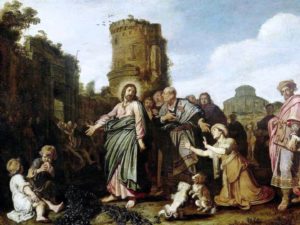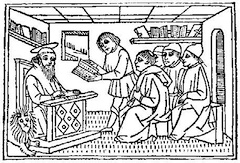Thoughts on Sunday’s Lessons for Sept. 12, 2021
First Reading (Track One): Proverbs 1:20-33
We turn back to the first chapter of the book of Proverbs this week, where we meet Wisdom personified as a powerful woman. “Be wise! Embrace knowledge,” she shouts out to the city and all its inhabitants.

Peter the Apostle (1743), oil painting on canvas by Giuseppe Nogari (1699-1766). Gemäldegalerie Alte Meister, Dresden, Germany. (Click image to enlarge.)
Wisdom roars in a prophetic voice; and like the prophets, she finds that many refuse to listen. When distress and anguish come to them, she warns, she will laugh and mock them. When they call on her in their panic, she will not answer. Echoing the covenantal warning that we hear often from the other prophets and in the Psalms, she warns, “the complacency of fools destroys them; but those who listen to me will be secure and will live at ease, without dread of disaster.”
First Reading (Track Two): Isaiah 50:4-9a
What is it like when great suffering stands between us and the goals we most desire? This challenging question recurs in Sunday’s readings. Isaiah raises this idea in the powerful metaphor of the Suffering Servant. What could be more important to a community than its teachers, whose words shape our growth and understanding? Isaiah portrays this teacher as a servant who suffers the humiliation of exile and turns away from those who strike him. To Israel he represented the nation awaiting vindication in its own exile. Christians would later interpret it as an image of Christ.
Psalm (Track One): Psalm 19
The heavens declare the glory of God! The beauty of creation rings out in this psalm of praise for God at work in the universe. Echoing the first reading’s exhortation to hear and attend to Wisdom’s word, the psalm’s verses urge us to rejoice in our hearts about God’s perfect law: Torah, the word that, in the original Hebrew, is synonymous with “teaching.” The psalm concludes with a familiar prayer that preachers often use to begin a sermon: “Let the words of my mouth and the meditation of my heart be acceptable to you, O Lord, my rock and my redeemer.”
Psalm (Track Two): Psalm 116:1-8
Like Isaiah’s Suffering Servant, the Psalmist, too, speaks from a place of sorrow and grief, in a Psalm traditionally understood as a song of thanksgiving for recovery from illness. Filled with despair, entangled in the cords of death, the Psalmist called out, and God responded. Now, rescued from death’s grip, his tears are wiped dry and his feet no longer stumble. Walking again in the land of the living, his heart fills with love for God, who has heard his voice in supplication.
Second Reading: James 3:1-12
A teacher’s tongue may reveal the way of God, but tongues can be tricky, this passage from the letter of James tells us in delightful wordplay. James likens this small but powerful organ to other small but powerful things that can control forces beyond their size: A horse’s bridle, a ship’s rudder, a spark that starts a forest fire. Our tongues can bless, but tongues may curse, as well. Watch our tongues, James warns. Use them wisely to praise and bless our brothers and sisters, not to express hurtful things.
Gospel: Mark 8:27-38
We have reached the midpoint of Mark’s Gospel, and the narrative is taking a turn. Last week we saw Jesus for the first time extend his ministry to a Gentile, healing a woman’s child. Now, in a strange conversation with his disciples, much new is unveiled: First, Jesus confirms Peter’s bold announcement, the apostles’ first revelation that Jesus is the Messiah. Then, to Peter’s horror, Jesus tells them that he must endure great suffering, rejection and death. If they want to follow him, Jesus warns, they must deny themselves, take up the cross, and follow him. If you wish to save your life, he warns, you must lose it first.



 I hate you! Angry words can spill out of us suddenly, before we have time to think about them. And then how we wish we could take back the hurtful things we said! James reminds us in a series of colorful metaphors that words have power. Echoing the Isaiah reading, he warns us that teachers bear a heavy responsibility to use words wisely. It’s up to us to use them well.
I hate you! Angry words can spill out of us suddenly, before we have time to think about them. And then how we wish we could take back the hurtful things we said! James reminds us in a series of colorful metaphors that words have power. Echoing the Isaiah reading, he warns us that teachers bear a heavy responsibility to use words wisely. It’s up to us to use them well.